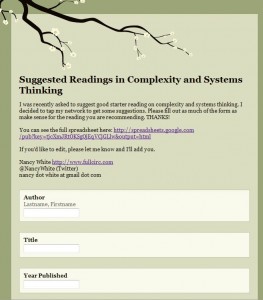A couple of weeks ago I shared the link to Donella Meadow’s seminal essay, Places to Intervene in a System. This was in the context of moving our perspective of some work from a linear progression to something complex.
She found the essay useful and asked “what basic readings would you suggest to follow up learning about complexity.”
 Well, I know enough to be dangerous in this area, rather than useful. So I turned to my network and asked for recommendations for suggested readings in complexity and systems thinking. I created a simple Google form that feeds into a Google spreadsheet. Then I tweeted out the request. Today there are over 25 entries, books both familiar and new to me. And from people who care about this topic.
Well, I know enough to be dangerous in this area, rather than useful. So I turned to my network and asked for recommendations for suggested readings in complexity and systems thinking. I created a simple Google form that feeds into a Google spreadsheet. Then I tweeted out the request. Today there are over 25 entries, books both familiar and new to me. And from people who care about this topic.
First, I want to thank all the people who have and who continue to add to this resource:
- @mgroffburling
- @rickladd
- Steve Holt (not sure of your url – there are a lot of Steve Holts!)
- @sleslie
- @marynations
- @Aaron_Eyler
- @rotkapchen
- @pcwoessner
- Viv McWaters
- @heatherdavis
- @guijti
- Ailsa Haxell (I THINK this is your blog?)
- Pete Smith (your url?)
- @connectirmeli
If you want to see or add to the resource, Suggested Readings in Complexity and Systems Thinking takes you to the spreadsheet to view. Below is the form to fill in if you have a suggestion. (Edit – just a screen shot. I forgot WP does not allow iframe! To fill out the form please go here.) If you leave me a comment, I can also add you to edit the spreadsheet directly if you would like.
Now my next step is to create a reading path through these, to build, and expand versus overwhelm us, the readers! Ideas? How would you navigate and why?
Later PS: Just saw this Tweet from Alice and it is sooo relevant:

